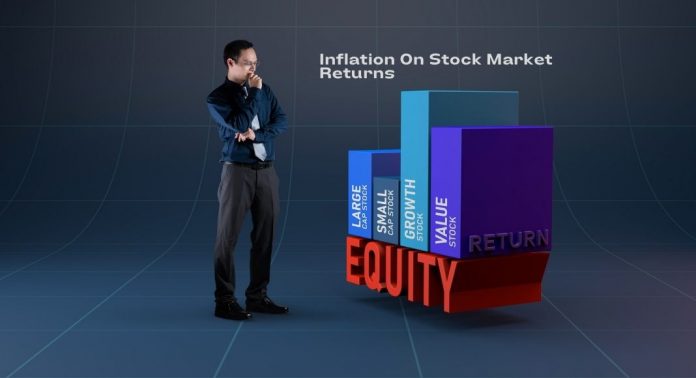The Effect Of Inflation On Stock Market Returns

As you probably know, inflation leads to a rise in the cost of both goods and services. In turn, that reduces buying power. Simply put, inflation increases the price of products and services, which makes it harder for consumers to buy things. It can also cause profits and revenues to decline. All of that equates to a slower economy until it eventually turns around.
Unfortunately, mismanaged finances can cause a business to fail and prevents individuals from achieving certain goals. Especially for investors, it’s essential to look at historical returns. That includes data for periods of low and high inflation. This information can dramatically lessen the impact on stock returns during a time when inflation is high.
If you’re an investor, your ability to hedge, combined with the government’s monetary policy, can impact stocks negatively or positively. Multiple studies show that during economic fluctuations, the effect of inflation can actually boost stock market returns. But continued inflation that is much higher than normal will generally lead to lower real stock market returns.

 To get latest news, follow Editorialge's Google News channel.
To get latest news, follow Editorialge's Google News channel. Another thing, the connection between stock returns and an unexpected inflation period brings light to new information regarding future prices. What it comes down to is that high inflation rates create more volatility of stock movements.
These same studies proved this fact, especially in emerging countries where volatility is much greater than in developed markets. Going back to the 1930s, history shows that virtually every country struggled the most with poor stock returns during times of extremely high inflation.
High inflation can signal bigger problems beyond the varying impact on stocks. The biggest concern isn’t about actual returns but rather the volatility of stock returns and knowing the right way to invest during a high inflation period.
Growth Compared to Stock Performance and InflationUsually, stocks get subcategorized as either “value†or “growth.†Stocks in the value subcategory have robust current cash flows. Over time, these will begin to slow down. Stocks in the growth subcategory don’t have much current cash flow, if any. However, they’ll increase slowly over time.
Keeping that in mind, when interest rates increase and you value stocks using the method for discounted cash flow, the stocks in the growth subcategory experience a more negative impact than value stocks. This is in part due to rising interest rates used to fight inflation. So, this indicates a negative impact for growth stocks and a positive impact for value stocks.
You might find it surprising that the rate of change in inflation doesn’t usually affect the return of value stocks. That is why some investors don’t recognize when growth stocks convert to value stocks. However, considering the impact on growth stocks is often significant, it’s important to know when one stock becomes the other (switches from a growth stock to a value stock).
Stocks That Generate Income During InflationRemember, your purchasing power decreases during a period of high inflation. So, if you want to invest in stocks that will generate income or perhaps those that pay dividends, make sure their dividends are growing while high inflation is around.
Also, with less buying power, dividend taxes cause a double negative impact. While dividends don’t keep up with inflation or tax levels, dividend-yielding stocks can provide you with a slight hedge during a high inflation period.
Something else to know is that the increase in interest rates caused by inflation affects dividend-paying stocks. As inflation rises significantly, income stock typically goes down. That means if you own dividend-paying stocks during a major upswing in inflation, you can expect to see the stock prices fall. The one positive aspect of high inflation is that you can purchase dividend-yielding stocks cheaply.
Impact Of High Inflation On Retirement PlansHigh inflation over time can really eat into a portfolio’s return simply through the phantom inflation tax. Inflation is taxed as a capital gain and possibly as income as well. You can run what-if inflation scenarios on retirement plans in financial planning software such as WealthTrace to see just how big of an impact future inflation might have on you and your plan. You might be surprised how a 1% increase in the inflation rate can impact how much you pay in taxes over a long period of time.
What It All MeansThere’s no question that inflation will affect your investment portfolio. In theory, you should have some hedge from your stocks against inflation as the result of a company’s growing revenues and profits following an adjustment period. However, knowing the exact decisions to make can feel a little overwhelming since inflation has varying effects on stocks.
The key is to look at stocks in the two subcategories of “growth†and “value.†When inflation is high, value stocks perform better. When inflation is low, growth stocks generally do better. To get a handle on anticipated inflation, analyze the commodities markets and the Treasury Inflation Protected Securities (TIPS) market. Commodities such as wheat and oil generally are a leading indicator of inflation. TIPS can show you the market’s prediction of the Consumer Price Index (CPI) since its yield is tied to increases in that inflation index. Using the TIPS yield, one can calculate exactly what the market’s prediction for CPI inflation is by simply subtracting the TIPS yield from a similar maturity Treasury bond yield.
0 Response to "The Effect Of Inflation On Stock Market Returns"
Post a Comment